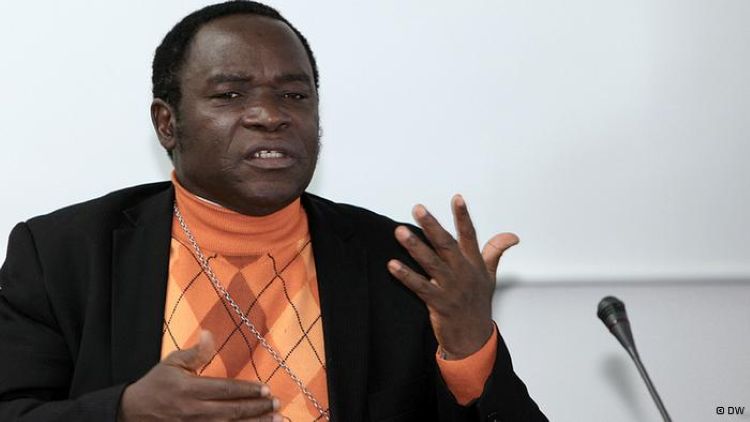Mathew Kukah, Bishop of the Catholic Diocese of Sokoto, has led a list of concerned Nigerians to meddle in the ongoing crisis between the Dangote Refinery and Petroleum and Natural Gas Senior Staff Association of Nigeria (PENGASSAN).
In a joint statement released by the Kukah and 12 others, the Bishop emphasised the need not to stifle the fundamental rights of Nigerian workers to join unions of their choice, adding that the recent industrial strike had sent out wrong signals to investors.
Group Chief Executive Officer of the Nigerian National Petroleum Company Limited (NNPCL), Bayo Ojulari, Monday, blamed the crisis between the Refinery and PENGASSAN for the scarcity and hike in prices of cooking gas.
“We, the undersigned, note with concern the recent disputes and disruptions surrounding the Dangote Refinery. Although the immediate crisis has been de-escalated through government mediation and renewed dialogue between labour and management, the episode raises important lessons for Nigeria’s economic future.
“For decades, Nigerians endured the collapse of government-owned refineries, the waste of trillions of naira in subsidies, and dependence on fuel imports. These failures left citizens exposed to scarcity, inflation, and insecurity. In this context, the Dangote Refinery represents more than a private venture; it is a national symbol of what bold domestic investment can achieve.
“Already, the refinery has begun to ease supply pressures, with petrol prices in some parts of the country dropping from around ₦1,500 per litre to about ₦820 — a 55% reduction. This impact on transport costs and food prices offers Nigerians a glimpse of how local productivity can improve daily life. It also signals to investors at home and abroad that industry, rather than speculation, can still thrive in Nigeria.
“However, the strikes and threats that accompanied this transition send the wrong signals. Industrial disputes, if not carefully managed, risk discouraging both domestic and foreign investment at a time when Nigeria most needs capital and innovation. A refinery of this scale is a national lifeline, with profound consequences for jobs, energy security, and inflation.
“Workers’ rights must be respected. The Constitution guarantees the right to organise and to demand fair treatment. No enterprise can succeed without motivated, fairly treated workers.
“Markets and productivity must be protected. The right to organise cannot become a license to hold the economy hostage. Productive enterprises that lower costs and create jobs must be safeguarded.
“Social responsibility and accountability must remain central. Investors of this magnitude must operate transparently, uphold fair labour practices, and reinvest in the communities they serve,” the statement partly noted.
Other members of the group include Educationist, Abubakar Siddique Mohammed, Human Rights Activist, Aisha Yesufu, Economist, Arunma Oteh, and Investment Banker, Atedo Peterside.
ECOWAS Commissioner for Political Affairs, Peace and Security, Dr. Salamatu Hussaini Suleiman, National Women Leader of Labour Party, Dudu Mamman Manuga, Ibrahim Dahiru Waziri, Khalifa Muhammad Sanusi II, Sarkin Kano, Obonganwan Barbara Etim James, Opeyemi Adamolekun, Osita Chidoka, and Senator Sola Akinyede, also jointly signed the statement obtained by Channels Television on Tuesday.
The group warned against monopoly, adding that other investors were free to play in the market.
It said embarking on strike actions capable of harming Nigerians should be avoided.
“We also note that concerns about monopoly or market dominance should not be settled by disruptive industrial action. Nigeria has institutions, such as the Federal Competition and Consumer Protection Commission (FCCPC), that are mandated to assess such claims. Where there are legitimate issues of pricing or dominance, the proper channel is through these statutory bodies, not strikes that harm ordinary Nigerians. Moreover, as has been noted, there is no legal monopoly here; others are free to invest in refining, provided they can mobilise the necessary resources and expertise.”
It commended the Federal Government and the Dangote Refinery for resolving the confrontational issues through dialogue, saying that the crisis was neither about the Refinery nor any other business but about the economy.
“We commend the Federal Government, labour unions, and Dangote Refinery for stepping back from confrontation and resolving this dispute through dialogue. We urge that this spirit of constructive engagement becomes a template for the future. At the same time, we must stress the dangers that such disruptions pose to investor confidence, economic stability, and Nigeria’s strategic interest in reducing dependency on imports.
“This crisis is not about a refinery or any other business. It is about the direction of our economy: whether we will continue in a cycle of scarcity and rent-seeking or build a future anchored in productivity, fairness, and shared prosperity. The Dangote refinery represents an audacious step forward. It should not be undermined but strengthened — as a signal to other industrialists that investing in Nigeria’s future is worthwhile.”
According to Ojulari, Nigeria lost 200, 000 barrels per day of crude oil production to the Dangote Refinery/PENGASSAN strike action.

